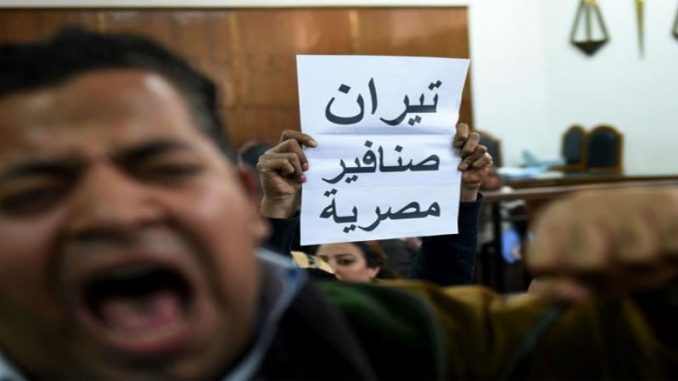
The Saudi Coast Guard has reportedly turned away three Egyptian tourist boats near the two Red Sea islands ceded in controversial deal, Tiran and Sanafir.
The incident occurred on Tuesday according to Lebanese newspaper Al-Akhbar. It is to be mentioned that Egypt’s Abdel Fattah Al-Sisi had previously waivered the two Red Sea islands to Saudi Arabia amid outrage by Egyptians in 2016.
The Saudi action comes despite a 2017 Egyptian government report stating that Egypt would maintain administrative control over the islands while ceding its sovereignty over them to Saudi Arabia.
“The agreement terminates only the part which concerns Egyptian sovereignty; it does not terminate the necessity and justification of Egypt’s protection of this region due to security reasons,” stated the report that was presented to Egyptian Parliament before ratifying Al-Sisi’s agreement with the Saudis.
Egyptian sources told Al-Akhbar that Saudi Coast Guard personnel expelled the three Egyptian boats from the islands’ vicinity on Tuesday.
In April 2016, Al-Sisi and Saudi King Salman Bin Abdelaziz signed a maritime demarcation agreement stipulating the transfer of sovereignty over the Islands to Saudi Arabia.
The agreement sparked outrage and a wave of rare protests from Egyptians that opposed the agreement. Opponents believed that Egypt’s Sisi sold Egyptian territory in return for Saudi aid, in order to avert criticism and possible riots over Egypt’s economic woes.
In its report to Parliament, the Egyptian government confirmed that the country would maintain administrative control over the islands to preserve Egyptian and Saudi national security.
In early February 2018, Saudi Arabian forces have replaced Egyptian troops on Tiran Island, marking the first step in the handover over of two Red Sea islands ceded to the Persian Gulf kingdom in a 2016 border agreement, according to a western diplomatic source.
The deployment of Saudi forces is intended to remedy the unclear legal position of Multinational Force and Observers (MFO) personnel on the island, the diplomat, whose home country is involved with the MFO in Sinai, told Mada Masr in late January, speaking on condition of anonymity.
MFO forces were stationed on Tiran to implement in 1979 peace treaty between Egypt and Israel. However, since Egypt transferred sovereignty of the Tiran and Sanafir islands to the oil-kingdom as part of a controversial maritime border agreement, the island is no longer subject to the treaty.
Prior to the stationing of Saudi troops, another western diplomatic source, speaking on condition of anonymity, told Mada Masr that there appeared to be three solutions to the murky legal position of MFO troops on Tiran Island. Either MFO and Egyptian forces would depart the island altogether, they would remain with Saudi approval or the 1979 treaty would be amended with a legal addendum allowing for the stationing of Saudi forces alongside MFO, which is the scenario that appears to be coming into effect.
Saudi Crown Prince Mohamed bin Salman announced the first planned Saudi project on the two Red Sea islands in October of last year. The project, an economic zone that runs over 26,000 square kilometers and includes both islands, also features a bridge between Saudi Arabia and Egypt and is scheduled for completion in 2025.
On April 5, 2017 Al-Sisi vowed to U.S President that Tiran and Sanafir deal will be fulfilled
The source, who spoke on the condition of anonymity, said “Sisi said that Egypt has not pulled back from the deal and that they are serious about carrying through with it after parliament approves the legal requirements.”
Egyptian court voided a previous decision to block the transfer the two Red Sea islands of Tiran and Sanafir to Saudi Arabia.
The court’s ruling came days after Sisi met with Saudi King Salman on the sidelines of the Arab League summit in Jordan, breaking the ice after months of tensions between the longtime allies.
Signs of reconciliation appeared recently between Egypt and Saudi Arabia.
First, media reports cited the Egyptian Petroleum Ministry saying that Saudi Arabian state oil company Aramco will resume oil product supply to Egypt some six months after halting them suddenly.
The move signaled a potential thaw in relations after months of tension after abruptly suspending delivering shipments of petroleum products October 2016.
The move was announced after Egypt voted in favor of a Russian-drafted UN Security Council resolution on Syria that Saudi Arabia strongly opposed.
It is worth to mention that Saudi Arabia is a leading supporter of the Syrian opposition, while Egypt has pushed for a political solution that might keep Syria’s dictator Bashar al-Assad in power.
Second, King Salman invited al-Sisi to visit Saudi Arabia during their recent meeting in the Arab Summit.
Hours after the ruling was announced, Egyptian judges held a news conference in protest of a draft law that expands the president’s control of the judiciary.
Judges believe the draft law is tailored to prevent specific judges from presiding over top courts and that it is linked to the two high-profile rulings that annulled the Saudi islands deal.
Moreover, the latest court decision has been met with angry responses.
Critics, journalists, and activists accused Abdel Fattah al-Sisi of “selling Egypt” to Saudi Arabia in return for financial aid.
In response, thousands of Egyptians took to the streets in protests on April 15 (Land Day) and April 25 (Sinai Liberation Day) against the agreement, calling for the “Downfall of the Regime.”
The demonstrations were the first huge movement against the al-Sisi regime that included different political affiliations and groups.
The Egyptian security forces led arrest campaigns of activists and journalists who opposed the transfer of the islands.
Moreover, Egypt’s courts have fined tens of the protesters while others were handed down prison sentences that ranged from two to five years.
In addition, a court sentenced seven defendants to eight years in prison each and fined them.



